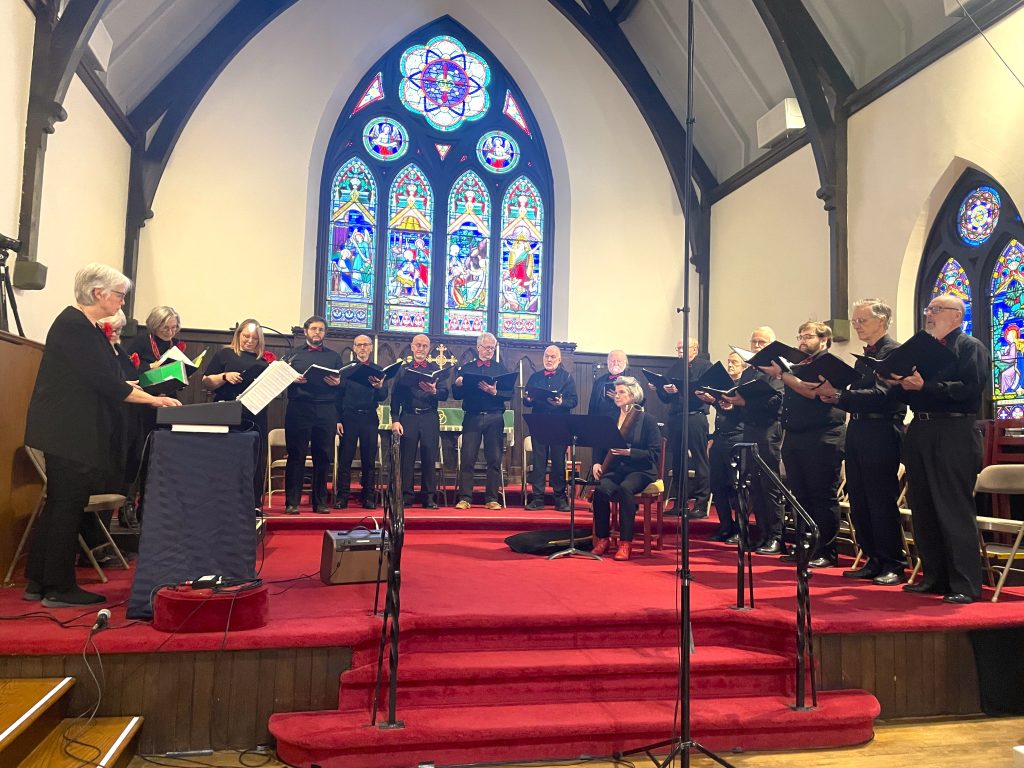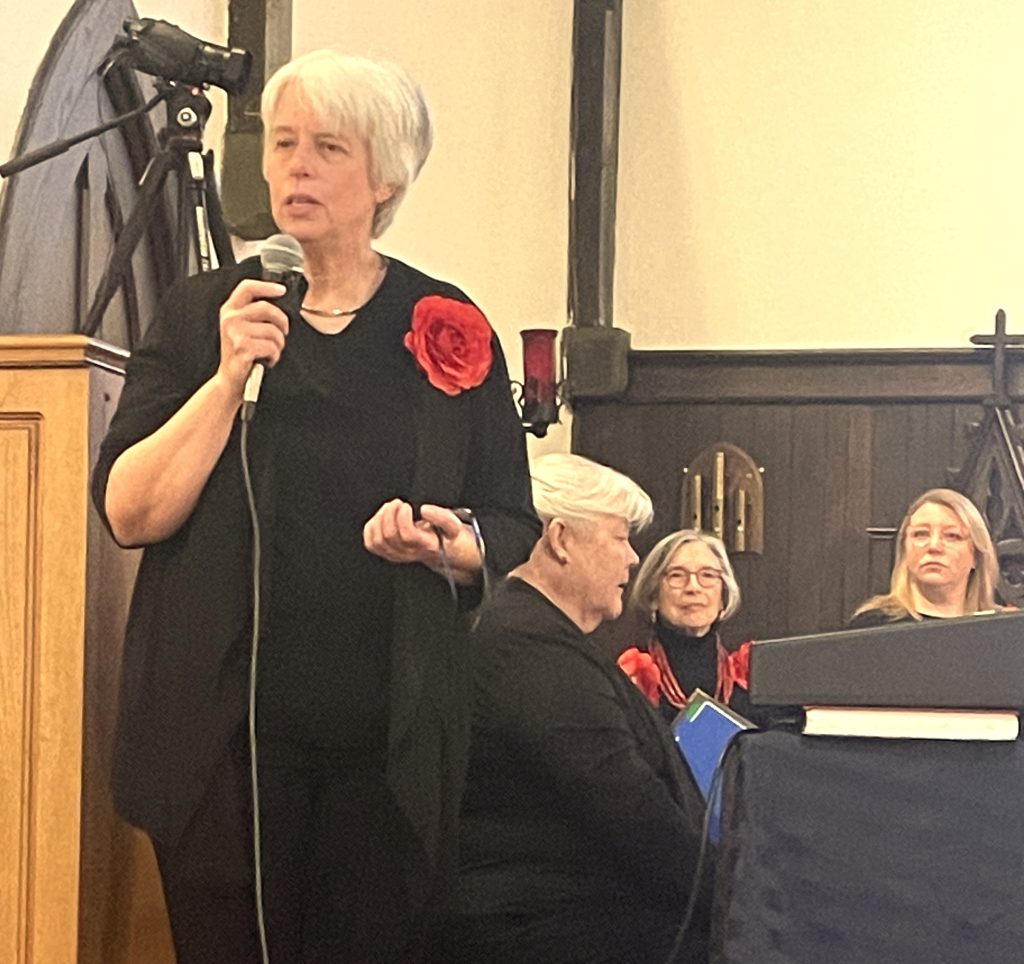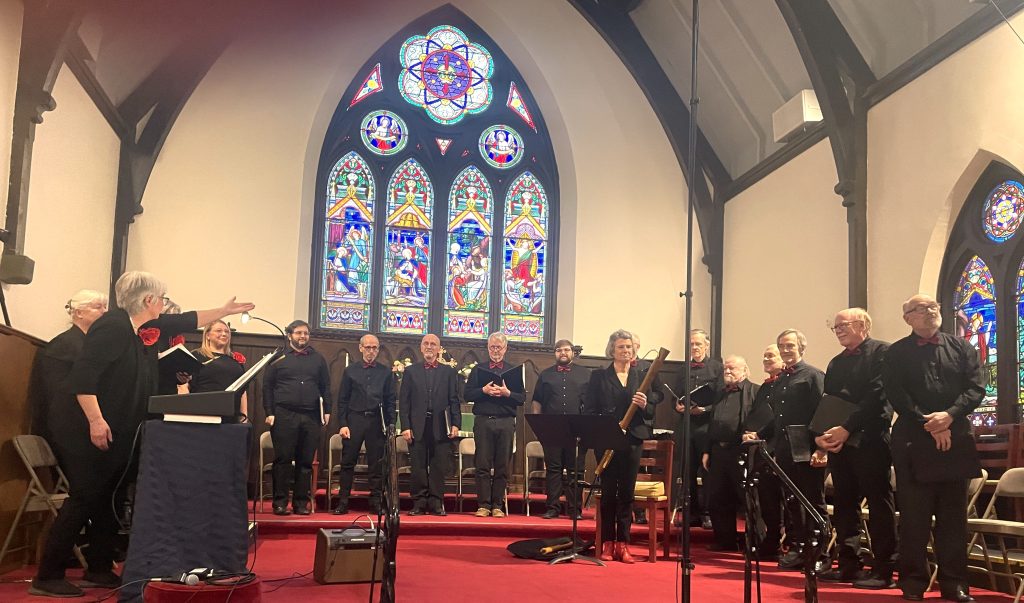
by Kevin T McEneaney
At Trinity Episcopal Church in Lakeville under direction of the irrepressible Christine Gevert, the Crescendo choir of sixteen singers (closer to twenty when one hears the tuneful projection of Gevert’s voice over the organ she is playing) chanted forth in sublime unity with a program focused on the development of polyphony from the fifteenth century to the seventeenth century. Of the sixteen singers, only four were women (including Gevert)—it is true that lower male voices dominate the aesthetic repertoire of this period.
The program opened with Gloria by Johannes Ockeghem (c.1410-1497) sung for a Latin Roman Catholic service, or as they say, mass, deriving from the Latin “the service is ended, and one is sent forth” to live the Christian life. This four-part exercise in harmony delivered the spirit of medieval sensibility with traditional text. That medieval voice aesthetic is as compelling today as it was way back then.
I was mildly disappointed that the program did not begin in the fourteenth century to feature the greatest European composer of that century, Guillame de Machaut, perhaps more noted for his boisterous secular songs as the last great troubadour than his religious polyphonic accomplishment of being the first cyclic composer of the complete Roman Catholic mass written for the cathedral of Notre Dame after his patron Jan Hus was murdered by Pope John the Twenty-second in the basement of his own house after being given a letter guaranteeing his safety by that said pope, one of the great papal monsters. (That John was immediately deposed and defrocked by the council he called and presided over.)

But I digress. A short, attractive Gregorian chant piece by Orlando di Lasso (1532-1594) followed with magnificent five-part harmony on the theme of peace. (When Roman Catholic services recite the “Our Father” prayer, they do not say “deliver us from evil or demons,” the latter being the gospel Greek, but in the Irish language they say “deliver us from war” because war is, and remains, the greatest evil possible.)
A more festive theme appeared by Costanzo Festa (c.1485-1545), one of the very first composers of Italian madrigals; this instrumental interlude offered two dance melodies with dialectical counterpoint performed with Gevert on organ and Rachel Begley on pipe dulcian.
Moving to Germany, Optime pastor by Heinrich Isaac (c.1450-1517) praised the goodness of those rare religious congregations with a good pastor as the lead tenor sang “Give peace in our time.” The history of warfare has been the norm in the lives of sapiens. Geneticists estimate that from 5,000 BC to 3,000 BC there were about twelve women alive for each man in Asia, Europe, and Africa during that period due to male obsession with war….
The motif of peace continued with Sustinuimus pacem by the Flemish composer Adrian Willaert (c. 1490-1562) who studied under Josquin des Prez, the leader of the Franco-Flemish style in Paris. Beginning in four-part harmony, then transitioning to five-part harmony, O Domine Jesu Christe, pastor boné by Josquin des Prez offered the concert’s crescendo moment that still echoes in my ears.
Gevert performed an organ interlude by the English Thomas Tallis (1505-1545) accompanied by flute which was followed by a four-part motet by John Taverner (1490-1545) on the theme of one’s final sleep from the woes of this world.
An audience sing along in four-parts followed, which worked better than one might imagine. The acoustics in the Church are wonderful! The final climax was a six-part work by Claudio Monteverdi (1567-1643) which was about the holiness of the rabbi who was illegally crucified nearly two thousand years ago.
On March 2nd Crescendo at Trinity Church will perform a program of Baroque Chamber Music Concerts with featured violinist Edson Schied, whose virtuosity I can ardently attest to.
